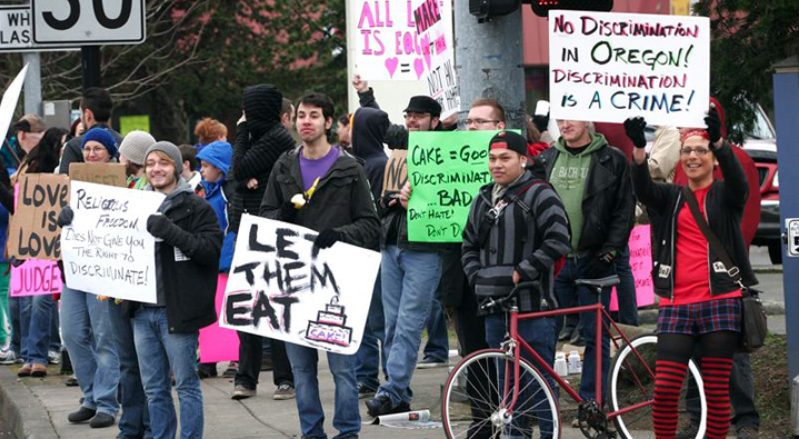
As Aaron and Melissa Klein await the final verdict on how much they'll be fined for refusing to bake a same-sex ceremonial cake for a lesbian couple, other businesses around the country are asking if the same type of thing could happen to them for standing by their Christian beliefs.
The Oregon Bureau of Labor and Industries found that the owners of Sweet Cakes by Melissa were in violation of a 2007 anti-discrimination law when they refused to make a cake for Rachel Cryer and Laurel Bowman February of 2013. Bowman and Cryer were long-time customers of the Kleins, but this particular design, set to celebrate a same-sex commitment ceremony, was against the Kleins' religious beliefs.
While many media outlets are reporting that the cake was for a same-sex wedding, it was actually for a commitment ceremony. The ironic part of the whole case is that Oregon didn't even recognize same-sex weddings at the time and the state defined marriage as being between a man and a woman, as voted upon in a 2004 amendment. So not only are the bakers arguing that this case goes against their constitutional right to religion, but their decision not to recognize a same-sex ceremony was right in line with Oregon's own laws at the time.
"Ironically, the state was in violation of its own anti-discrimination laws," Aaron Klein pointed out.
Months after the alleged discrimination took place, a federal judge ruled that Oregon's amendment defining marriage as the union between a man and a woman was unconstitutional, which then opened up the possibility for same-sex marriages in the state.
So for this reason, other states are showing concern over a similar fate if they refuse to compromise their Christian beliefs.
Alabama radio host Matt Murphy told Yellowhammer News that he believes the best thing Alabama's legislators should do is to be proactive in preventing such confrontations. Murphy suggests a "Religious Liberties Act" that would "clearly state that if you are in a business which you may be asked to violate your heartfelt religious beliefs in the exercise of your business, you have the right to deny service."
If this type of guard isn't set into place, a whole lot of people could exploit the system to make a lot of money and tie up legal services at the taxpayers expense.
"I think it's one of our founding principles, and a founding amendment to the Constitution clearly supersedes, especially when it is a heartfelt religious conviction," Murphy continued. "In the same way that the Supreme Court is expected to argue that the Constitutional rights of two gay people override the will of the people of Alabama, I would argue (for) the Constitutional rights of a religious person that truly believes that participating in a ceremony like that is going to violate their religious beliefs."
Oregon lawmakers are expected to determine exactly how much the Kleins will owe Bowman and Cryer during a hearing on March 10. Some say the total could reach as high as $150,000, which Aaron Klein says will bankrupt the couple and their five small children.







